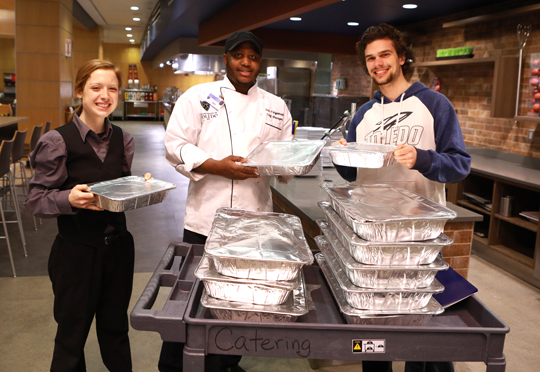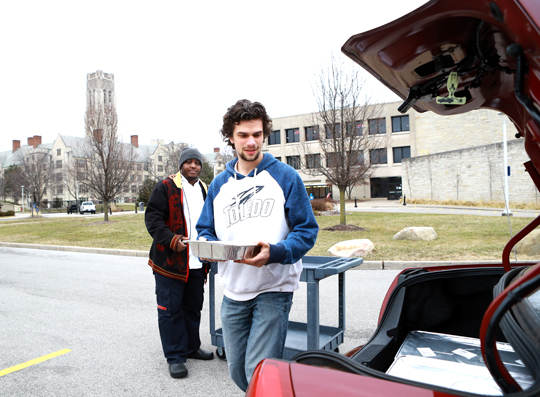The University of Toledo is addressing food waste and hunger with the Food Recovery Network, the largest student movement to fight waste and feed people in America.
UT’s chapter is the fourth largest donor of recovered food among Ohio colleges involved with the organization. Since its inception in fall 2015, the UT group has donated more than 6,500 pounds of food to those in need in the Toledo community.

Kate Barbee of the catering staff, Chef Manager Otis Fitzpatrick, center, and Jacob Beakas of the UT chapter of the Food Recovery Network posed for a photo last month with food that was donated to an area organization.
In addition to recovering food from on-campus dining halls, the chapter collects leftovers from Panera Bread every week. In the past, members have worked with various UT campus events, alumni tailgates, Monnette’s Market, and Fowl and Fodder.
“Lucas County has one of the highest poverty rates in Ohio,” said Krisha Conley, president of the UT chapter of the Food Recovery Network. “To see how much waste college campuses provide nationwide is unsettling. This program not only provides a meal to those who are hungry, it connects the campus to the community in a way that is personal and humbling.”
Founded in 2011, the Food Recovery Network has 230 U.S. chapters that have distributed more than 2 million pounds of perishable food that otherwise would go to waste on campuses, restaurants and stores.

Jacob Beakas of the UT chapter of the Food Recovery Network loaded his car with food from the University to take to a local shelter as Chef Manager Otis Fitzpatrick watched.
“Overall, our waste at UT is relatively low, but we do see the amount of a donation increase as we go into winter or summer break due to closing of our locations,” said Gary B. Casteel, resident district manager with UT Dining and Hospitality Services.
“Items donated vary weekly depending on the menu offerings at our locations. Donated foods include fruits, vegetables, beef, poultry, pasta, desserts and more,” Casteel said. “Our priority is to offer our guests a top-quality product at a good value, but if there are usable leftovers, we wish to ensure they are put to good use by supporting our local community and those in need.”
In addition to the weekly donations, the students in the UT chapter of the Food Recovery Network also volunteer at the Cherry St. Mission and are working toward more volunteer opportunities at St. Paul’s and Family House.
“Administrators have a responsibility to engage with our students in support of the common good through stewardship and philanthropy,” Bonnie Murphy, UT associate vice president for auxiliaries, said. “College life raises students’ awareness of the importance of advocating for kindness. We would like to think we play a part in our students’ development.”
Conley said the organization also helps to provide an educational standpoint for students as they can learn how much food is wasted and teach them to be more aware on how much they consume.
“My experiences with the Toledo community has humbled me beyond belief and taught me to love my neighbor no matter the circumstance,” Conley said. “I am constantly mindful of what my actions are doing to impact others. The Food Recovery Network has provided a spot in my heart to serve others by action and creating relationships instead of being a bystander.”
To learn more about the organization or to get involved, contact Conley at krisha.conley@rockets.utoledo.edu.